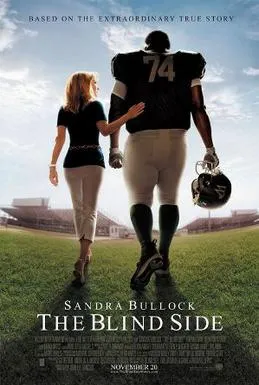Historical accuracy of The Blind Side

Historical accuracy of The Blind Side

Characters
Michael Oher
Based on the real Michael Oher. While his difficult background is factual, Oher strongly disputes the film's portrayal of him as unintelligent and lacking football knowledge before the Tuohys' intervention. The central premise of his adoption by the Tuohys is also false; they established a conservatorship.
Leigh Anne Tuohy
Based on the real Leigh Anne Tuohy. Sandra Bullock's Oscar-winning portrayal captures her assertive personality. However, Oher alleges the narrative of her "saving" him is exaggerated and part of a fabricated story that benefited the Tuohys financially.
Sean Tuohy
Based on the real Sean Tuohy. Portrayed by Tim McGraw as laid-back and supportive. Oher's lawsuit challenges the motivations and financial arrangements presented in the film regarding the family's involvement.
S.J. Tuohy
Based on Sean Tuohy Jr. The film depicts him bonding with Oher and helping him with football plays (using condiments). The extent and nature of this interaction's importance is part of the disputed narrative.
Collins Tuohy
Based on the real Collins Tuohy. Portrayed by Lily Collins as accepting and friendly towards Oher. Her role is secondary to the main disputed narrative.
Miss Sue
Based on Sue Mitchell, Oher's real-life tutor. The film portrays her as a key figure in helping Oher improve academically to become NCAA eligible, which aligns with her known role. Played by Kathy Bates.
More characters
Denise Oher
Based on the real Denise Oher. The film accurately touches upon her struggles with drug addiction, which contributed to Michael's difficult upbringing and time in foster care.
Coach Cotton
A composite character likely based primarily on Briarcrest Christian School coach Hugh Freeze and potentially other coaches involved with Oher. The specific school name ("Wingate Christian") was also fictionalized.
Story
Oher's background (homelessness, mother's addiction)
The film accurately reflects Oher's challenging childhood, marked by poverty, homelessness, his mother's addiction, and periods in foster care.
Leigh Anne spots Oher walking in the cold, takes him in
This specific inciting incident is depicted in the book and film. Oher had stayed with multiple families, including occasionally the Tuohys, prior to permanently moving in.
Tuohys "adopt" Michael Oher
This is the central disputed point. Oher alleges he was misled into signing conservatorship papers shortly after turning 18, believing they were adoption papers. The Tuohys became his conservators, not his adoptive parents. The conservatorship was terminated in late 2023.
Oher learns football nuances from Tuohys (S.J., Leigh Anne)
Oher strongly refutes this, stating he understood football well before living with the Tuohys. He played football in high school before they became his conservators. The film's portrayal minimized his existing knowledge and skills.
Portrayal of Oher's intelligence / academic struggles
Oher acknowledges academic struggles due to lack of consistent schooling but feels the film inaccurately portrayed him as unintelligent ("dumb"), rather than educationally disadvantaged.
Tutoring helps Oher become NCAA eligible
Oher required significant academic improvement (raising his GPA, supported by tutoring from Miss Sue) to meet NCAA eligibility requirements for Division I athletics.
NCAA investigation regarding Ole Miss recruitment
An NCAA investigation did occur due to the Tuohys being Ole Miss boosters and Oher choosing to attend their alma mater. The film dramatizes the investigation and Oher's reaction. The Tuohys cite circumventing NCAA rules as a reason for the conservatorship.
Oher chooses to attend Ole Miss
Oher did attend the University of Mississippi and played football there.
Tuohy family profits from Oher's story/film
Oher's lawsuit alleges the Tuohys (parents and children) profited significantly from the film deal (receiving $225k + 2.5% profits each) while he received nothing. The Tuohys and film producers dispute this, stating Oher was paid and proceeds were shared.
Oher's bond with the Tuohy family depicted
The film presents a heartwarming story of familial bonding. Oher's lawsuit suggests a more complex reality where he felt exploited and the "family" relationship based on the conservatorship was misrepresented to him and the public.
Oher's success leading to NFL career
The film correctly shows Oher's development into a top prospect drafted into the NFL (by the Baltimore Ravens in 2009).
Setting
Memphis, Tennessee (Early 2000s)
The film captures the general atmosphere and locations relevant to the story in Memphis during the early 2000s.
Briarcrest Christian School environment
Though renamed "Wingate Christian" in the film, it accurately portrays the setting of the private school Oher attended, highlighting the socio-economic contrasts.
University of Mississippi (Ole Miss)
Represents the setting of Oher's college football career, including the campus atmosphere and SEC football culture.
Tuohy family home / Affluent setting
Contrasts Oher's background with the wealthy environment of the Tuohy family's home in Memphis.
Hurt Village housing projects
Represents the impoverished area where Oher's biological mother lived, highlighting the difficult circumstances Oher came from.
High school football culture
Accurately portrays the importance of high school football in the American South, including recruitment processes and community involvement.
Costumes, cars, props
Generally reflects the styles, vehicles, and technology common in the early-to-mid 2000s timeframe depicted.
